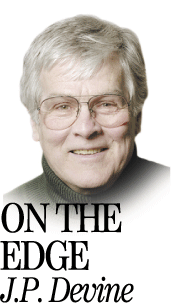“Dead” is such a sharp, brittle word. “Deceased” is a morgue word, an obit phrase. The old black people of my childhood seemed to concur on “passed.”
So many I knew have gone that I feel the need to find an acceptable word to soften the loss. Ray thought of death that way. Once, when I mentioned to him how so many of my family were “gone,” he kind of shuddered.
“Nobody’s gone,” he said, “They’re all still around us, helping us.”
I can’t be sure, but knowing Ray Bradbury, and the way he thought, I’m certain he envisioned the “next world,” as a space of his own creation, perhaps even a return to that “ravine,” he wrote of when he wrote about “Green Town.”
Green Town was really Waukegan, Ill. He knew I was familiar with it, because like him, I had crossed that big green space in the middle of town many times. When I was 13, the age Ray was when he left Waukegan, I lived there with my brother and his wife. We later discovered I lived on the same street as Ray’s grandparents.
By then, he was long gone and already a famous writer. I met Ray when I was working in a famous bookstore in Beverly Hills. When I was wrapping his books, I spoke of Waukegan. That did it. Waukegan? Who in Beverly Hills, even in Southern California, but for Jack Benny, knew of Waukegan, Ill.? Our brief, glorious friendship began.
He took me for coffee on long lunch hours and when I had a day off. Sometimes we stood in the front of the store and just exchanged stories about Waukegan. He told me the now famous story of his meeting with “Mr. Electrico” at a carnival in 1932, the year I was born. I told him about “Esmeralda,” the plastic fortune teller in the glass booth at a carnival when I was nine. Amazing.
We compared our fears: We both hated flying and driving in cars. Ray biked or walked, as I did. Sometimes we just stood in front of the store, where he introduced me to his passing friends: novelist Christopher Isherwood, writer and painter Henry Miller and actor John Gielgud. I discovered that everyone knew Ray Bradbury, or wanted to.
When he saw that I was passionate about writing, he asked me who I read. He thought my list too short and decided to intervene. He took me by the hand — literally, by the hand — as though I were twelve, and walked me across Beverly Hills to the library, where, in the space of one hour, he checked out, on his own card, a stack of books by writers he insisted I had to read: Faulkner, Nathaniel West, Raymond Chandler, Dashiell Hammett, the stories of John Cheever and others I had never heard of. It was my education.
Then at that end of summer, he was gone. He was in constant demand for readings and lectures. They were making movies and television plays from his works. “The Halloween Tree” had debuted and he was busy pushing that. He left the streets where he loved to walk and talk and bike.
In the last note I got from him, he bemoaned the lack of private time, just to write and talk. He’d be back, he said. He would call. Then the fame that had started with “Fahrenheit 451,” and now the filming of it, became a big wind and blew him away. Smaller winds took me away, and we never met again. But his friendship and advice informed the rest of my life, as it did for countless others.
Ray Bradbury has passed, but he was right. He is not gone. He will be with me, with all of us, for all time to come. A hundred years hence, when words are written on the wind, and read on the crystal walls of distant planets, Raymond Bradbury will be there. Goodnight Ray, wherever you are, and for helping me write this. Did I get it right?
J.P. Devine is a Waterville writer.
Send questions/comments to the editors.



Success. Please wait for the page to reload. If the page does not reload within 5 seconds, please refresh the page.
Enter your email and password to access comments.
Hi, to comment on stories you must . This profile is in addition to your subscription and website login.
Already have a commenting profile? .
Invalid username/password.
Please check your email to confirm and complete your registration.
Only subscribers are eligible to post comments. Please subscribe or login first for digital access. Here’s why.
Use the form below to reset your password. When you've submitted your account email, we will send an email with a reset code.